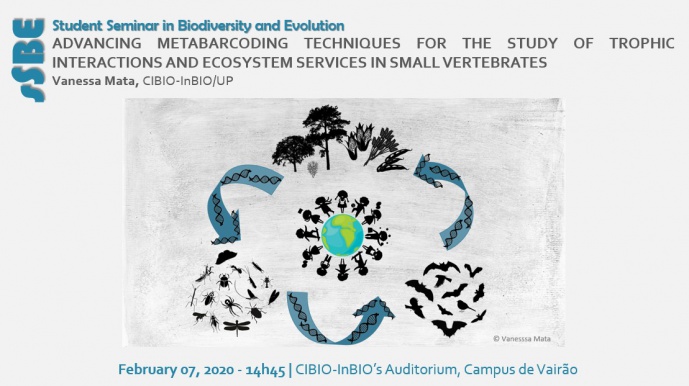Advancing metabarcoding techniques for the study of trophic interactions and ecosystem services in small vertebrates

STUDENT SEMINAR IN BIODIVERSITY AND EVOLUTION
Small insectivorous vertebrates can deliver important ecosystem services such as pest control, thereby reducing the need of agrochemical inputs. The flow, stability and resilience of such services are critically dependent on the trophic networks between these animals and their prey, which are presently poorly understood. Metabarcoding tools can offer unprecedented detail in the diet of small insectivorous vertebrates, providing key understanding on their role in the provision of ecosystem services. However, the application of these techniques is still in its infancy, and the impact of their technical caveats and limitations on the estimate of trophic interactions still needs to be fully understood. The goal of this work is to advance the use of metabarcoding techniques in the study of species interactions, thereby enhancing its applicability in the management of complex landscapes. Specifically, it aims at: i) understanding the impacts of technical and biological replication on metabarcoding dietary analysis; ii) testing the use of multiple overlapping markers in dietary analysis, and define criteria for integrating them; iii) assessing the power of taxonomically resolved dietary data to reveal subtle intraspecific variations in predator-prey relationships; and iv) evaluating species’ roles in sustaining pest regulation services in a multifunctional landscape. The results stress that maximizing biological replication is critical in dietary metabarcoding studies and that the integration of multi-marker data provides far more detailed dietary information than any single marker approach. Moreover, metabarcoding proved to be a powerful tool, capable of detecting subtle intra- and inter-specific variations. The combined use of metabarcoding with ecological network analysis further allowed the description of the first predator-pest interaction network of bats and insect agricultural pests, along with the identification of bat species that could be favoured to intensify the control of pests. Overall, this work underlined the value of metabarcoding to unravel the functional role of small vertebrates in multifunctional landscapes, while providing guidance on best practice to minimise the potential caveats and limitations of this technique.
Vanessa Mata holds a MSc in Biodiversity, Genetics and Evolution from the University of Porto, Portugal. Currently, Vanessa Mata is enrolled in the BIODIV program and has just delivered her thesis under the supervision of Dr. Pedro Beja (CIBIO-InBIO - Applied Ecology), Dr. Hugo Rebelo (CIBIO-InBIO - CONGEN) and Dr. Gary McCracken (University of Tennessee, USA).